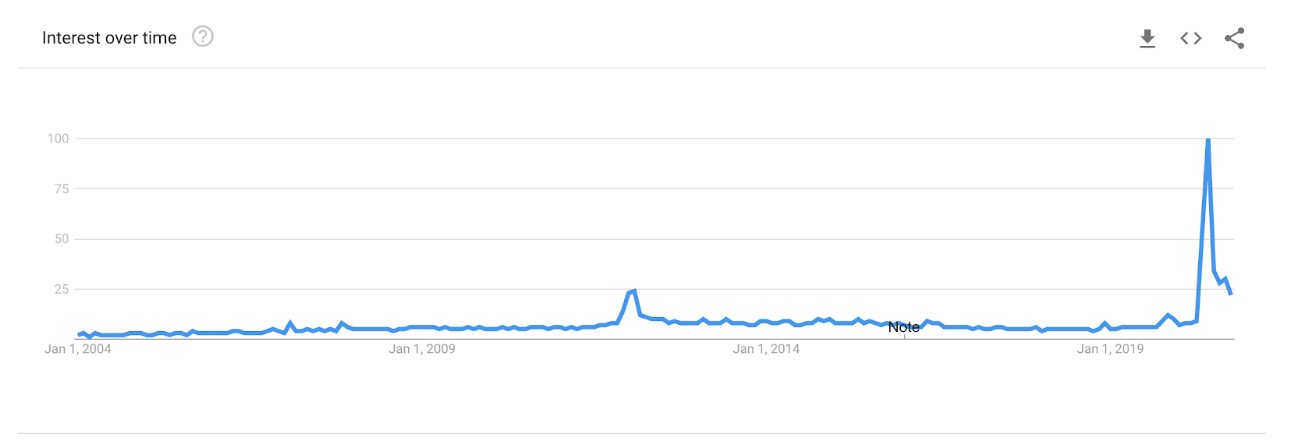The Odd Musical History of ACAB
Screen Cap of “ACAB” search trends all time on Google
By Caleb Peck
By now everyone has heard the term ACAB, “All Cops Are Bastards”. While it’s been in circulation in leftist movements for the past few years, the acronym has now exploded into the mainstream. Throughout the protests this summer regarding police brutality, the four letters have become a rallying cry for many leftists.
But curiously the phrase is certainly not a modern invention, it’s been around for decades, and what’s even more curious is its roots in a late 70’s British Punk movement named Oi!
As it often happens, scenes grow tired and sell out. To the Oi! movement, British punk bands like the Sex Pistols or The Clash were already trending towards the commercialism that they once claimed to reject. Guitarist Steve Kent of The Business claimed the scene was born due to punk being seen as “trendy university people using long words, trying to be artistic...and losing touch.” The reaction was a grimy scene of bands that thrived on vulgarity and harshness, with bands taking names like, “Cock Sparrer” or “The 4-Skins”.
The scene was mostly made up of dissatisfied Punks, Skinheads, and working class individuals who were searching for something “real”. They felt their experiences as kids who had grown up on the streets of England were suddenly being appropriated by upper middle class kids who romanticized their lifestyle without ever living it. To quote music journalist and former punk, Gary Bushell, “Street punks were disgusted both by the proliferation of phoneys and posers and the Kings Road conmen with their rip-off boutiques… The Oi poloi didn’t need Punk’s proletarian wrapping paper.”
This divide created a hotbed for anarchy and with that, anti-cop and government sentiments, exacerbated by the high tensions that already existed in the UK at the time. The anarchist movement eventually began to adopt “ACAB” a phrase casually thrown around the UK, and was immortalized by The 4-Skin’s 1982 anarchist anthem, “A.C.A.B”. The phrase being so flagrantly presented in a song brought the term to the eyes of pop culture and media, opening it up to an audience outside of the British working class for the first time.
Despite many early Oi! Bands promoting leftist movements and having staunch anti-racist politics, the history of the scene is rather conflicting. The genre’s rise to prominence coincided with a large surge of white nationalism flooding Britain, led by political groups like the National Front (NF). Anarchist thought being promoted during a time of nationalism immediately led to many of those in the working class to identify with radical right groups like the NF. While members of the scene claim that this was as small minority of their audience, the perception of the community became sour amongst the eyes of the British. Rightfully so -- any amount of Nazi’s is too many.
British media often clashed with the scene, criticizing its ties and overlap with nationalism and xenophobia. Naturally, widespread demonization by the media lead prodded at the restless belly of the working class Oi! kids, who felt as if they were being unfairly characterized. Further complicating this debate was the events of July 3rd, 1981, when a concert billing three Oi! powerhouses (The 4-Skins, The Business, and The Last Resort) was booked in the traditionally Asian neighborhood of Southall. Word spread quickly as reports of racism from concert-goers lead to masses of Asian youths to take to the streets in protest and defense. Police and individuals from both sides ended up clashing, leading to 33 arrests, 60 police officers with serious injuries, and the actual venue burning down due to the use of petrol bombs.
There’s certainly grounds to characterize the scene as one full of racism and white supremacy, but Bushell defended Oi!, “there was a far right element among them but this was 1980 when the far right were polling 15 – 20 per cent of the vote in inner-city wards. It would have been a miracle if there hadn't been NF sympathisers in the audiences.” This is far from a perfect defense, but Bushell’s point isn’t completely off base. Oi! Is not the first punk scene to struggle with alt-right invaders. Due to the anger that is core to the music and to the scene, both far-left and far-right supporters are often attracted to the punk’s sound and ethos. American bands like Black Flag or Fugazi had very similar experiences when it came to skinheads invading the progressive scene they had hoped to create.
So, while it’s not necessarily shocking that Oi! suffered from these ails, I can’t help but feel like it’s a bit weird that this term that has become a radical-left staple was probably once used to criticize cops for stopping skinheads from doing hate-crimes. Though on the other hand, it does certainly put to rest the idea that ACAB somehow doesn’t mean that “all cops are bastards”, but rather the system as whole. Quite literally the people who originated this word were fighting cops in the streets on a consistent basis. I‘m pretty sure these guys weren’t trying to critique the system, but rather it came out of a place of genuine anger and hate.
I don’t really feel like this piece should end with some big flashy answer to whether the term is good or bad. It’s roots in the British working class criticizing those in power certainly reflects what’s going on today, and in it’s current iteration it does reflect a progressive stance on police. However, I do think it’s important to analyze where the word comes from, and acknowledge it’s very white connotations. Advocating for the term to be eradicated seems far too extreme, but I think that learning about the origins of the phrase that has populated the left will help us reckon with what those letters might once have stood for.

